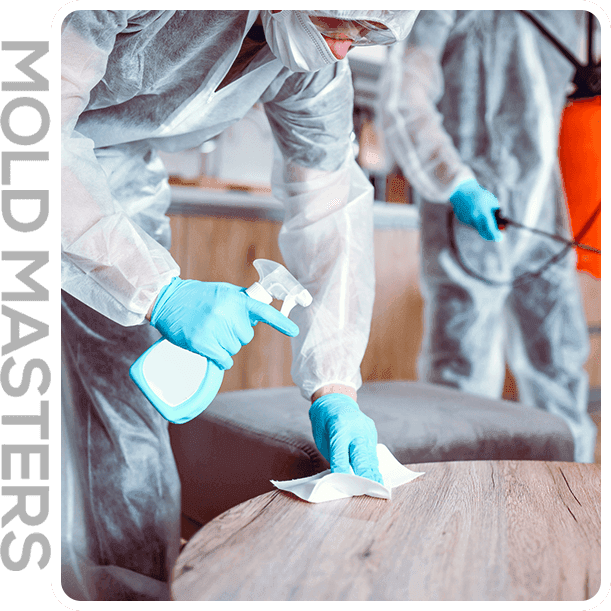
Biohazard & Crime Scene Cleanup in Knoxville
.2408211132550.jpg)
Professional Biohazard and Crime Scene Restoration
Biohazard cleanup is an essential process in various scenarios where exposure to hazardous biological substances could pose serious health risks. Common situations requiring professional biohazard cleanup include the aftermath of crime scenes where biological fluids have been present, as well as suicides and hoarding scenarios.
At Mold Masters, we recognize the sensitive nature of many circumstances that require biohazard cleanup and are here to make this process as efficient and painless as possible. Our compassionate cleaning specialists have the training, equipment, and knowledge needed to safely remove and dispose of hazardous materials. We comply with all applicable health regulations and are also prepared to disinfect the affected areas if necessary. Biohazard situations often come unexpectedly, requiring professional assistance that not only cleans but also restores safety and peace of mind. Don't hesitate to call the experts in biohazard cleanup Knoxville residents depend on.
Our team is available 24/7, so do not wait to call (865) 351-6344 or contact us online if you need biohazard cleanup in Knoxville.

Hear From Our happy Customers
-
“They responded very quickly, worked around the GC’s schedule, got the job done and we didn’t experience any delays to our construction schedule.”- Andy S.
-
“They did great!! Loved working with them.”- Amy M.
-
“Amazing customer service, knowledgeable, and kept in contact with me throughout the job!”- Aaron W.
-
“My crawlspace was a disaster, Mold Masters made it like brand new.”- Michael B.
What Are Biohazards?
A biohazard refers to any biological substance that poses a threat to the health of living organisms, primarily humans. These hazards can come in various forms, including bacteria, viruses, fungi, and other microorganisms that can cause disease. In situations where these substances are present, professional biohazard cleanup is needed to mitigate the risk of exposure and contamination.
Below is a list of common types of biohazards that require specialized cleanup protocols:
- Bloodborne pathogens. These include infectious agents found in human blood that can lead to severe health issues, such as HIV, hepatitis B, and hepatitis C. Cleanup in incident scenarios, such as accidents or violent crimes, necessitates specialized training and equipment to safely handle contaminated blood and bodily fluids.
- Infectious waste. This category refers to materials that may be contaminated with pathogens and is typically relevant in healthcare environments. Contaminated dressings, syringes, or laboratory cultures require proper disposal and cleaning to prevent the spread of infection.
- Chemical hazards. While not strictly biological, many chemical hazards can also pose significant health risks. For instance, methamphetamine labs often produce biohazards from both the drugs and the chemicals used in their production. Cleanup requires a thorough understanding of both biological and chemical safety protocols.
- Hoarding debris. In extreme cases of hoarding, accumulated organic waste can lead to the growth of mold and bacteria, creating a hazardous environment. Professional biohazard teams are necessary to safely decontaminate these areas and restore the safety of the living space. We offer mold removal and remediation services that can prove crucial in these scenarios.
Understanding the scope and danger of biohazards highlights the necessity for specialized cleanup services. Not all biohazards are visibly detectable; some can linger unseen in porous surfaces and environments, demanding thorough evaluation and sanitation strategies. At Mold Masters, we are equipped to handle these complex situations, ensuring comprehensive evaluation and cleanup. That's why we're the biohazard cleanup service Knoxville homeowners rely on. Our approach extends beyond immediate cleaning, focusing on the prevention of future biohazard risks through advanced techniques and preventive measures.
Need discrete and thorough biohazard cleanup in Knoxville or nearby areas? Our certified specialists provide safe and respectful restoration. Contact us at (865) 351-6344 or fill out our online form today.

What Are the OSHA Guidelines for Biohazard Cleanup?

The Occupational Safety and Health Administration (OSHA) has established comprehensive guidelines to promote safety during biohazard cleanup operations. These regulations are crucial for protecting workers from exposure to hazardous biological materials. Understanding and adhering to these guidelines is pivotal not only for worker safety but also for legal compliance. Failure to meet OSHA's requirements can lead to significant penalties and increased risk of health complications for both workers and clients. As part of adherence, Mold Masters ensures that all protocols, from personal protective equipment (PPE) usage to waste disposal, align with OSHA's stringent standards. Our commitment to these guidelines reflects our dedication to maintaining the highest safety standards in every project we undertake. That's what makes us the biohazard cleanup company Knoxville residents trust.
Here are the key components of OSHA guidelines relevant to biohazard cleanup:
- Bloodborne Pathogens Standard (29 CFR 1910.1030). This standard mandates that employers maintain a written exposure control plan, which outlines how to minimize worker exposure to bloodborne pathogens. This includes identifying tasks that may involve exposure and implementing safety measures, such as offering vaccinations for hepatitis B and providing appropriate personal protective equipment (PPE) to employees.
- Personal protective equipment (PPE). OSHA requires that employers assess the hazards associated with biohazard cleanup and provide appropriate PPE to their workers. This may include gloves, masks, goggles, face shields, and protective clothing. It is mandatory that workers are trained on how to properly use and dispose of this equipment to prevent contamination.
- Decontamination procedures. Proper decontamination protocols must be established to handle potentially infectious substances. Cleaning solutions used must be effective against the specific pathogens encountered, and contaminated surfaces should be cleaned and disinfected following established procedures to eliminate risks of exposure.
- Waste disposal regulations. OSHA guidelines insist that biohazardous waste is disposed of in accordance with federal, state, and local regulations. This involves using specific color-coded bags or containers labeled for biohazard disposal. Ensuring proper handling during the transport and disposal of hazardous waste is pivotal in reducing risks to workers and the public.
- Training and record-keeping. Employers are obligated to provide training for workers involved in biohazard cleanup. This training should cover the risks associated with biohazards, proper cleaning procedures, and emergency response protocols. Additionally, OSHA requires that employers maintain records of training and exposure incidents to ensure compliance and track any potential health impacts.
- Emergency action plans. OSHA guidelines advise establishing emergency action plans tailored to biohazard incidents. These plans should detail procedures to follow in the event of accidental exposure or spills, including immediate reporting protocols and medical follow-up steps.